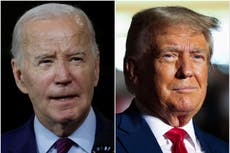Trump and one co-defendant plead not guilty in superseding Mar-a-Lago indictment
Former president waives right to appear in court during arraignment, enters plea via attorneys
Donald Trump and his aide Walt Nauta pleaded not guilty in federal court on several charges claiming that the former president kept classified documents at his private Florida club Mar-a-Lago and attempted to hide some of them from government authorities with the help of his staffers.
Mr Trump, who waived his right to appear at the Thursday arraignment in Fort Pierce, Florida, entered his plea via his lawyers. The waiver was filed last week by his lawyer Christopher Kise.
The ex-president was initially charged with 37 crimes in a June indictment, to which he pleaded not guilty. The following month, prosecutors added another three charges in a superseding indictment.
Mr Nauta attended the hearing on Thursday, where he also pleaded not guilty after being charged with six counts in the initial indictment and another two counts in the superseding filing, according to The Washington Post.
The third defendant in the classified documents case, Mar-a-Lago property manager Carlos De Oliveira, faced his first charges in the superseding indictment. He was set to enter a plea to the four charges against him on Thursday but he wasn’t arraigned because a Florida-based lawyer had yet to make the court aware that Mr De Oliveira is a client, which is a requirement for an arraignment to take place in federal courts in South Florida.
Mr De Oliveira was allegedly involved in a scheme with Mr Nauta and Mr Trump to attempt to delete surveillance footage showing Mar-a-Lago workers moving boxes containing government documents that federal authorities had said needed to be handed over.
Mr De Oliveira has now appeared in court twice without being arraigned. He also went to court last week but didn’t enter a plea as he didn’t have a Florida-accredited attorney.
As conditions of their release ahead of trial, Florida judges on the federal level have barred the three defendants from communicating with witnesses about the facts of the probe.
Federal prosecutors under the guidance of Special Counsel Jack Smith have alleged that Mr Trump committed 32 counts of illegally retaining national defence information and of deceiving investigators.
Mr Nauta and Mr De Oliveira face charges of obstructing the probe and lying to the authorities.
The judge in the case, Trump-appointed Aileen Cannon, has scheduled the trial to start in late May next year, in the middle of the Republican primary.
Mr Trump was indicted earlier this year on business fraud charges on the state level in New York – in connection to the hush money payment to adult actor Stormy Daniels ahead of the 2016 election – the trial is set to begin in March.
Mr Smith also charged Mr Trump this month in connection to his attempts to overturn the 2020 election in a separate probe.
Mr Trump’s lawyers asked Judge Cannon to account for Mr Trump’s campaign schedule as he attempts to take back the White House in 2024.
The case regarding the mishandling of national defence information will be tried under the Classified Information Procedures Act (CIPA), which outlines what needs to be done ahead of a trial to determine what classified information will be used in court proceedings.
This process is set to slow down the discovery phase as it might prompt further pretrial motions and hearings, The Post noted.



Bookmark popover
Removed from bookmarks